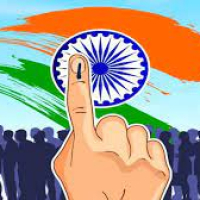Election Guidelines
Election Guidelines
The Election Guidelines, also known as the Model Code of Conduct (MCC), are
directives put forth by the Election
Commission of India (EC) to oversee the behavior of political parties and
candidates during electoral processes. These directives become active as soon
as the election timetable is announced and remain applicable until the
declaration of results.
The MCC aims to uphold the integrity of elections by
fostering fair competition among contestants and preventing the abuse of
governmental resources for electoral purposes.
Historical Development
The MCC has undergone changes since its inception in the
1960s. Initially, it consisted of informal agreements among political factions.
Its formal introduction occurred in 1971 prior to the 5th Lok Sabha elections.
Since then, it has been issued before each central and state election,
undergoing revisions as needed. The overarching goals of the code include
ensuring fairness among political parties, minimizing inter-party conflicts,
and maintaining law and order during the electoral period. Its primary function
is to prevent the ruling party from leveraging governmental resources for its
electoral advantage. This aspect of the code contributes significantly to its
broad acceptance across all political entities. Parties adhere to the code in
anticipation that others, particularly the ruling party, will do the same, thus
avoiding unfair advantages. Another factor contributing to its efficacy is its
restrained nature, which parties find manageable to comply with. In 1991, the
EC officially adopted the MCC, periodically updating it to address emerging
challenges and incorporate new provisions.
Principal Regulations
General Behavior
Political groups and candidates are urged to refrain from
personal attacks, offensive language, or actions that exacerbate existing
divisions or foster animosity among communities. Exploiting caste or communal
sentiments to secure votes is strictly prohibited.
Assemblies and Marches
Parties and candidates must observe local regulations and
obtain necessary permits for organizing public gatherings and marches. They
should notify authorities about the timing, location, and route of any public
assembly to facilitate proper arrangements and prevent inconvenience to the
public.
Guidelines for Polling Days
Campaigning within 100 meters of polling stations is
prohibited. Parties and candidates are barred from distributing alcohol,
bribing voters, or intimidating them. They must not transport voters to or from
polling stations or use vehicles for campaigning without proper authorization.
Government Officials and Public Resources:
Ministers and other government officials are prohibited from
blending official duties with electoral activities. They cannot announce
financial grants, initiate new projects, or pledge public works during the MCC
period. Utilizing government resources, vehicles, or personnel for campaigning
is strictly forbidden.
Election Platforms:
As per the 2019 addition to the MCC, election platforms
should align with the principles and values enshrined in the Constitution.
Parties must justify their promises in the platforms and outline the means to
fulfill financial requirements.
Implementation and Sanctions:
The MCC lacks legal force but violations may constitute
offenses under the Indian Penal Code (IPC) and the
Representation of the People Act, 1951. Penalties for these offenses
include fines and imprisonment.
The EC has the authority to issue warnings, reprimands, or
even revoke the recognition of a political party for repeated MCC violations.
Individual candidates may receive show-cause notices, face FIRs, or have their
candidacies canceled.
Noteworthy Incidents and Controversies
Over time, there have been several instances of MCC breaches
by political entities:
During the 2019 Lok Sabha elections, the EC reprimanded Prime
Minister Narendra Modi for his comments about former Prime Minister Rajiv
Gandhi.
In the 2014 Lok Sabha elections, the EC ordered the removal
of billboards featuring the then-Chief Minister of Tamil Nadu, J. Jayalalithaa,
as they violated the MCC.
In 2017, the EC censured Delhi Chief Minister Arvind Kejriwal
for remarks about bribery during the Goa Assembly elections.
Criticism and Discussion
Despite its success in promoting fair electoral practices,
the MCC has encountered criticism:
Some argue that its provisions are inadequate and fail to
address issues like paid news, misinformation, and social media campaigning.
Critics also highlight the absence of legal backing for the MCC, leading to selective enforcement. Calls have been made to grant it legal status for enhanced effectiveness and uniform application.
Know More:
Read
daily current affairs in English : Click Here
Read
daily current affairs in Tamil : Click Here
Check
the latest jobs update details : Click Here
Our Achievements:
https://www.youtube.com/watch?v=MLRj6js0X5U
https://www.youtube.com/watch?v=ung7VREhwYI
Download our Mobile Application: Android Mobile | IOS Mobiles
Our Website's:
https://www.bestlearningcentre.in/
Office Location:
https://goo.gl/maps/9JCNNv3HAkC4b92X7
For any clarification, you may contact us at any time.
Educational Counsellor: 7418968881
Customer Support: 7418978881
Enrol Now for Fresh Batch in UPSC | TNPSC | BANK | SSC | RRB |
POLICE | TNTET | CTET | NDA| CDS | AFCAT | DEFENCE | TANCET | CAT | MAT | ZAT
EXAMS.
Call Admission Desk: 7418968881
Book Free Demo Class Now !
Batches available in ONLINE & OFFLINE
